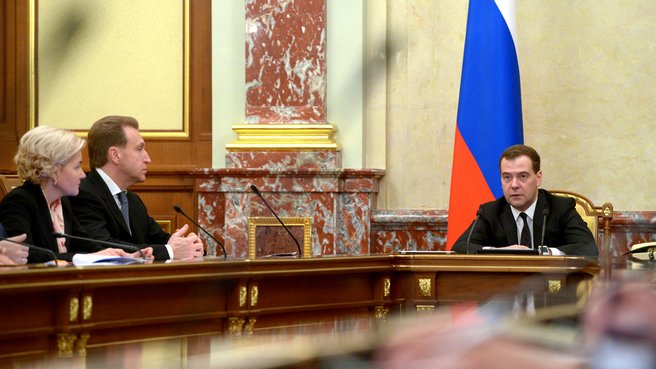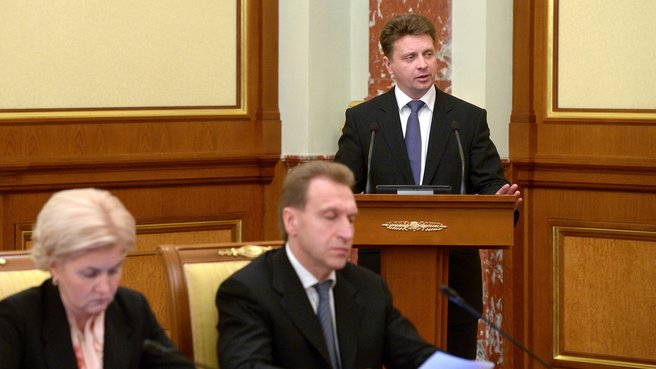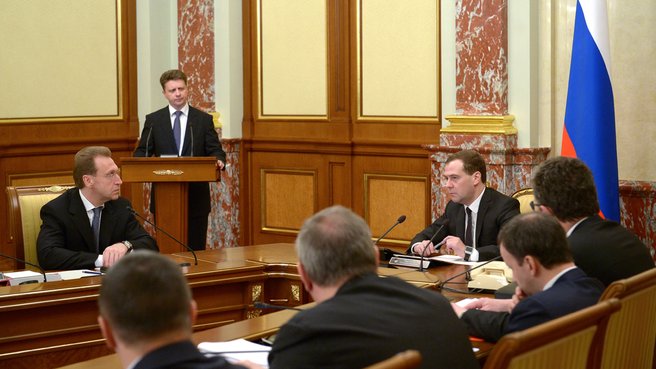The main issue – implementation of the comprehensive programme on public transit security.
Dmitry Medvedev’s opening remarks
Report by Minister of Transport Maxim Sokolov
Dmitry Medvedev: Good afternoon,
Today we’ll discuss the implementation of the comprehensive programme on public transit security and its extension to a new period. This programme was designed for three years: from 2010 to 2013. During this time security equipment was installed on eight metros, 37 railway stations, 30 airports and 31 sea ports. The federal budget spent a considerable sum of 46 billion roubles for this purpose as of 1 January 2014.
Dmitry Medvedev: "This programme was designed for three years: from 2010 to 2013. During this time security equipment was installed on eight metros, 37 railway stations, 30 airports and 31 sea ports. The federal budget spent a considerable sum of 46 billion roubles for this purpose as of 1 January 2014."
The tragic events that took place in Volgograd last December revealed that the task of enhancing public security in airports, railway stations and roads remains relevant. This is why we discussed transit security at the first meeting I conducted this year. I instructed my colleagues to consider the extension of this programme for the next few years on the same budget: 46 billion roubles.
Let me repeat that these are substantial funds, but security is worth it, all the more so since my colleagues have told me that we’ve learned to spend money rationally. I hope this experience will be useful in the next few years.
I’d like to draw the attention of all departments that will take part in this programme. These are huge sums, especially now that the budget is facing difficulties. We’ll have to search for funding and take it out of some other programmes. This is why it is very important to compile a list of priorities for this programme. Both department officials and heads of transport companies spoke about this.
Second, all new transport facilities should be built with the observance of modern security requirements.
Dmitry Medvedev: "The tragic events that took place in Volgograd last December revealed that the task of enhancing public security in airports, railway stations and roads remains relevant. This is why we discussed transit security at the first meeting I conducted this year. I instructed my colleagues to consider the extension of this programme for the next few years on the same budget: 46 billion roubles."
Third, rescue teams should arrive more quickly at accident sites or emergency zones. If additional transport vehicles are needed, we must include the requirements of the Federal Security Service, the Ministry of the Interior and the Emergencies Ministry into the draft programme. Moreover, some tasks can be resolved by improving coordination between ministries and departments.
Fourth, it is important to include in the programme a specific list of transport facilities that require additional security equipment because of the huge passenger load. We know how many transport facilities we have and must set our priorities right. We have the world’s largest territory and this programme should focus on the most important and vulnerable places.
We will retain the task of carrying out each and every decision of the programme. I’m sure this will help enhance security on public transport throughout the country.
The draft programme has been submitted to the Government. I hope all adjustments to the federal budget will be made promptly; otherwise we won’t be able to resume this programme this year, considering the continued funding of this programme was not planned for this year. The Minister will report on what has to be done.
And a few more points. We’ll talk today about the development of public-private partnership under concession agreements. They are being discussed on a large scale. We must continue improving regulations and using this in business practices.
A draft law on the foundations of public-private partnership has been presented to the Duma. This is a basic document that defines state regulations in this sphere. The Ministry of Economic Development and the Ministry of Finance should upgrade this draft for the second reading with due account of the Government-drafted provisions. This must be done. This document must be endorsed – it has been sitting in the Duma for quite a long time.
Dmirty Medvedev: "Considerable funds will be spent on the Credit Guarantee Agency. We hope that will allow it to expand the scale of loans to small and medium-sized businesses and reduce the risks of credit organisations that are not too enthusiastic about supporting small companies. These companies often do not have enough property that could serve as collateral for their commitments."
Let’s discuss today a draft that is designed to expand the sphere of concessions, primarily by lifting legal restrictions. The rules for concession agreements should become more specific and transparent. They should enhance the protection of investors’ rights, in particular by providing guarantees of returns on investments and the priority right to purchase the relevant property.
The mechanism of paying the investor will cover all properties under concession agreements, not just some types, as is the case now. They should be openly listed to create an opportunity for signing a concession agreement on the basis of private initiative.
And one more point. It concerns government support for small and medium-sized businesses. I’m referring to the establishment of a non-banking credit organization – the Credit Guarantee Agency – and relevant amendments to the Law on the Federal Budget. We discussed this issue a couple of days ago, at the meeting I chaired on Monday. All details were promptly coordinated and today we’ll review this issue at this Government meeting and I hope it will be finalised.
Considerable funds will be spent on the agency. We hope that will allow it to expand the scale of loans to small and medium-sized businesses and reduce the risks of credit organisations that are not too enthusiastic about supporting small companies. These companies often do not have enough property that could serve as collateral for their commitments.
The agency will also coordinate the work of regional guarantee funds, which are currently at sixes and sevens, but should pursue uniform Government policy. There should be uniform standards on terms of loans and requirements to borrowers, on collateral and other ways of securing obligations. I hope the agency will work efficiently and bring benefit to our business people.
Let’s move on to the first item on the agenda. Mr Sokolov, please go ahead. Before you begin, though, could you please update us on the accident in Kirov. What happened there and what measures are being taken?
Maxim Sokolov: Mr Medvedev, colleagues, in pursuance of the presidential executive order, the Ministry of Transport in conjunction with the FSB, the Interior Ministry and the Emergencies Ministry, as well as other federal executive bodies, Russian regions and transport organisations have developed and implemented a comprehensive transport security programme.
The goal of this programme was to improve the level of protection of human life and health in transport and provide protection against acts of unlawful interference.
The programme is based, without exception, on the principles and mechanisms of Federal Law No. 16, On Transport Security, which sets forth a uniform procedure for building the transport security system in Russia. This goal was achieved by the corresponding federal authorities as they worked on achieving relevant functional priority goals and carrying out specific activities.
The Emergencies Ministry worked on ensuring protection against manmade and natural disasters as well as information and awareness programmes. Protections against natural and manmade emergency situations, as well as mass transit information and awareness systems, have been designed and tested. An automated emergency search and rescue automated system has been developed.
The GLONASS satellite navigation equipment has been installed on over 7,000 vehicles operated by the Emergencies Ministry.
Maxim Sokolov: "Seventeen Russian regions now have hardware and software complexes for reading license plates; federal and regional databases are being developed; and the necessary equipment has been bought, such as radio communication devices and database access systems for police officers."
The Interior Ministry has carried out anti-crime measures and improved police rapid response on transport. Seventeen Russian regions now have hardware and software complexes for reading license plates; federal and regional databases are being developed; and the necessary equipment has been bought, such as radio communication devices and database access systems for police officers. The police working in the metro now have access to industry-specific communications systems and databases.
Over 11,000 special devices have been purchased for the law-enforcement officers working on transport and almost 600 units of modern forensic equipment for conducting explosive, facial composite and fingerprint analyses, as well as examinations of materials, substances and products have been bought. The logistics of canine units on transport have been substantially improved. A canine unit has also been established in the Trans-Baikal Territory, and three existing canine centres in the Siberian Federal District have been upgraded.
The Federal Security Service has developed 18 different prototypes of transport security devices, including an X-ray scanner for screening passengers and baggage, a remote control air conditioning system on transport, a laser-desorption explosives detector for pedestrian traffic, as well as a dedicated test centre for certification of technical devices that are used to protect the transport complex.
Maxim Sokolov: "Over 11,000 special devices have been purchased for the law-enforcement officers working on transport and almost 600 units of modern forensic equipment for conducting explosive, facial composite and fingerprint analyses, as well as examinations of materials, substances and products have been bought."
The Ministry of Transport and subordinate federal agencies and organisations have equipped transport infrastructure with engineering and technical means in accordance with the recommendations of the FSB’s 11th centre. Importantly, the budgetary subsidies were used to buy the equipment only for the federally-owned transport facilities, including waterworks on inland waterways and seaports, federally-owned airfield and airport infrastructure, as well as particularly important manmade facilities on federal roads and important socioeconomic facilities, such as metros and railways, which are not federally owned.
Metro subsidies were provided to all eight Russian metro systems, including the Volgograd Metrotram. The Moscow and St Petersburg metro systems will use their allocated funds in full this year. The Kazan metro was funded better than others in connection with the World University Games.
As you have mentioned, 37 major railway stations were outfitted with transport security equipment, including the security area at the railway station in Volgograd, which was also built as part of this comprehensive programme.
Safety rails have been installed along individual portions of the tracks used by high-speed trains Sapsan on the Moscow-St Petersburg-Helsinki and Moscow-Nizhny Novgorod lines, as well as the least protected portions of the railway tracks in the North Caucasus, especially in Dagestan.
Thirty major airports have been equipped with transport safety devices, as well as 31 water areas of our major seaports, primarily Vladivostok, Murmansk, Novorossiysk and Kaliningrad, including nine ports that can service nuclear-powered ships.
Maxim Sokolov: "Fifty-four inland waterway facilities have been properly equipped, mostly on the federally-owned hydroelectric plants built on the Moscow Canal and the Volga, Don, Kuban and Kama rivers."
Fifty-four inland waterway facilities have been properly equipped, mostly on the federally-owned hydroelectric plants built on the Moscow Canal and the Volga, Don, Kuban and Kama rivers.
Pilot projects involving engineering and technical equipment and transport security system at bus stations have been carried out in the motor transport and road infrastructure sphere. The same work was performed on vehicles that provide interregional passenger service in Dagestan, Ingushetia, Chechnya and other North Caucasus republics, as well as the Moscow Region.
Thirty important road facilities located mostly on the roads of the North Caucasus Region and on the M4 Don Motorway have been properly equipped. Safety equipment was installed on the bridge across the Bosphorus Strait on Russky Island in Vladivostok as part of the preparations for the APEC Leaders’ Meeting.
On a separate note, mass transit vehicles and all transport infrastructure facilities to be used in Sochi during the Olympics were outfitted with safety equipment as part of the comprehensive programme, and new transport facilities were built in accordance with the transport security rules included in the construction estimates.
Maxim Sokolov: "Thirty important road facilities located mostly on the roads of the North Caucasus Region and on the M4 Don Motorway have been properly equipped. Safety equipment was installed on the bridge across the Bosphorus Strait on Russky Island in Vladivostok as part of the preparations for the APEC Leaders’ Meeting."
The Ministry of Transport also created a unified state-run transport security information system. Its segments are distributed throughout Russia and installed in the offices and regional departments of federal agencies and the Federal Service for Supervision of Transport (Rostransnadzor).
A personal passenger traffic information database was created as part of the information system. This database is fully integrated with the systems operated by the FSB and the Interior Ministry, and is now fully operational.
The passenger traffic database is used for the online transmission of information on long-distance rail and air transport, including internationally, as well as bus and interregional transport servicing established routes, as well as international maritime transport and inland waterway transport on certain routes.
Despite certain difficulties in dealing with the European Union, all 113 foreign airlines that operate flights to Russia transmit corresponding information.
Our security forces make full use of the passenger transport information system to screen passengers arriving in Sochi for the Olympic Games and track the whereabouts of individuals on the wanted list.
Maxim Sokolov: "In accordance with the comprehensive programme of the Ministry of Transport, 10 training centres for transport security have been established at subordinate educational institutions. More than 1,500 specialists have been trained already. The graduates often become trainers themselves."
In accordance with the comprehensive programme of the Ministry of Transport, 10 training centres for transport security have been established at subordinate educational institutions. These centres are staffed by professional trainers and are equipped with modern technology. This is Russia’s only specialised training system, which produces well trained transport security professionals. More than 1,500 specialists have been trained already. The graduates often become trainers themselves.
A public and passenger transport security awareness programme was conducted as well. It was an important aspect of our work. We produced print materials and videos that were used in the media. They were also used at the airports, train stations, inside trains and other places where passengers can see them.
We did a lot to ensure transport safety and security, resulting in the arrest of over 1,500 individuals on the federal wanted list and over 1,100 individuals on local wanted lists, as well as the seizure of more than 800 guns, including through the use of detection dogs. Twice as many explosive devices were found last year as compared with 2012. Details will be provided in the official report.
Funding for the comprehensive programme totalled 46.526 billion roubles. The savings were achieved mainly through competitive biddings. Over 40 regulatory and legal acts were passed in order to meet the requirements of transport security over the period under review. The Ministry of Transport in conjunction with the Federal Security Service, the Interior Ministry and other federal agencies has drafted amendments to the law on transport security. The law was signed by the President on 3 February.
Mr Medvedev, I provided an update on the Gorky railway accident, so give me another three minutes to finish my report.
Dmitry Medvedev: That time wasn’t included, and the timer wasn’t on, so go ahead and finish your report.
Maxim Sokolov: Thank you. I’ll move on to the programme that was submitted to the Government. We have come up with a draft comprehensive programme for 2014-2016 to ensure transport security at the socially important venues of the 2018 FIFA World Cup pursuant to presidential and Government resolutions. The draft also includes measures that are funded to the tune of about 46 billion roubles.
We have held several Government meetings led by Arkady Dvorkovich. If adopted, this programme will, of course, boost public transport security. I’d like the Government to support this programme for the next period. That concludes my report. Thank you.
Dmitry Medvedev: Thank you.
<…>















